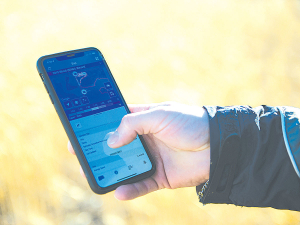DairyNZ Levy Vote Underway as Chair Highlights Seven-Fold Return
Voting has started for the renewal of DairyNZ's milksolids levy.
 AR technology was one of many new science, technology and farming practices discussed at the Farmers’ Forum.
AR technology was one of many new science, technology and farming practices discussed at the Farmers’ Forum.
Imagine a farmer being able to tell a paddock’s pasture cover and dry matter content just by looking at it, or accessing information about a cow’s body condition score in the same way.
Augmented reality (AR) glasses, used in a recent pilot project involving DairyNZ and Lincoln Agritech, has the potential to make this possible.
AR is a fast-growing technology that adds information to what people can perceive with their senses. For example, using an AR headset, a farmer can see any relevant information, voice recorded data or connect with an off-farm expert who can also see what the farmer is looking at.
Farmers and rural professionals at DairyNZ’s Farmers’ Forum in Waikato heard that DairyNZ has collaborated with Lincoln Agritech to investigate how AR could make a difference on dairy farms, including potential benefits and limitations. An investigation is being carried out into how AR technology can be used for pasture management, farm machine maintenance and body condition scoring.
DairyNZ says the pilot project has demonstrated the potential of AR technology.
“Further opportunities for supporting onfarm tasks, training and remote supervision will be explored,” it says.
The pilot project on a Canterbury farm allowed a farmer to use AR equipment to identify and display useful data about his paddocks. A team with no experience in condition scoring was able to assess the BCS of cows using information loaded into the AR headset. The date was recorded with a few swipes of the finger in the air. In another test case, the AR headset was programmed to visually locate the grease points on a tractor.
The AR technology was one of many new science, technology and farming practices discussed at the Farmers’ Forum, attended by about 300 farmers and rural professionals. They also heard about options to reduce methane emissions, using plantain to reduce N loss, strategies to remain profitable in a high inflation environment and harnessing new technology. Snapshots on research on boosting cow fertility, improving animal wellbeing and addressing environmental challenges were also presented by DairyNZ scientists.
DairyNZ chair Jim van der Poel told Rural News that he was happy with the turnout. He says the event gave farmers the opportunity to engage directly with scientists involved in research and to find out what’s going on.
Speaking at the Farmers’ Forum, van der Poel says science and farmer innovation will once again find solutions to challenges facing the dairy sector. He says the dairy sector is facing different challenges today than what it faced three decades ago.
“The research we did in the 80’s and 90’s helped dairy to outcompete other land uses and we saw dairy expand, especially in the South Island.”
The dairy sector grew by 100% between 1985 and 2015. This meant dairying became more intense and covered a larger area.
Van der Poel says this increased dairy’s environmental footprint and the number of high-quality people needed to run those operations.
“And once again science and farmer innovation will be a key factor in finding solutions.”
He says DairyNZ is currently in the decade of research into methane reduction, nitrogen leaching and changing the job on farm through modern farming practices and technology.
Van der Poel believes dairying has a great future.
“We are globally recognised for the quality of what we produce.
“The commitment to funding the science we need to do to resolve today’s issues, together with our innovation and resilience, will help us get there.”
Voting has started for the renewal of DairyNZ's milksolids levy.
The most successful catchment groups in NZ are those that have 'a source to sea' approach.
Associate Agriculture Minister and Manawatu dairy farmer Andrew Hoggard says the free trade agreement (FTA) negotiated with India is not a bad deal and his party, Act, will support it when it goes before Parliament.
Newly released data from Environment Canterbury (ECan) Farm Environment Plan (FEP) audits are showing a dramatic lift in environmental performance across the region.
A solid recovery of global dairy prices this year makes a $9.50/kgMS milk price almost a shoo-in for this season.
As New Zealand marks the United Nations’ International Year of the Woman Farmer 2026 (IYWF 2026), industry leaders are challenging the misconception that women only support farming.

OPINION: Here w go: the election date is set for November 7 and the politicians are out of the gate…
OPINION: ECan data was released a few days ago showing Canterbury farmers have made “giant strides on environmental performance”.